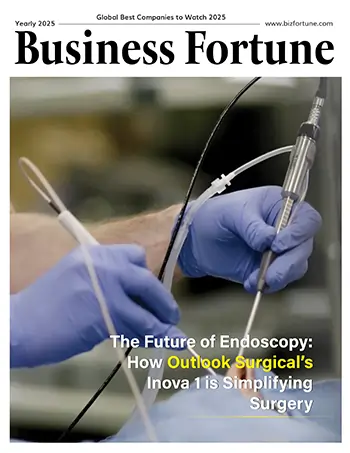Home Industry Healthcare AI is the role in Boosting Dia...
AI is the role in Boosting Diagnostic Accuracy and Treatment Plans
Healthcare

Business Fortune
19 September, 2024
Healthcare is undergoing a transformation thanks to artificial intelligence (AI) in diagnostics, which is providing unprecedented levels of efficiency and precision. AI technologies are revolutionizing the diagnosis, analysis, and treatment of diseases, especially in the field of medical diagnostics. AI can process enormous volumes of data quickly and effectively by utilizing machine learning and neural network algorithms, giving healthcare practitioners priceless insights.
AI Role in Boosting Diagnostic Accuracy and Treatment Plans
Healthcare professionals can now make better judgments because to the rapid and precise analysis of massive volumes of health data analytics provided by AI and machine learning algorithms. Medical practice is about to undergo a transformation because to these technologies, which may analyze medical images, identify trends, and even forecast the outcome of diseases.
-
Enhanced Accuracy: By evaluating complicated medical data and minimizing human error, AI algorithms increase diagnostic accuracy.
-
Early Identification: Machine learning algorithms are able to recognize the first indications of conditions like cancer even heart disease, which enables prompt treatment.
Advantages Artificial Intelligence in Healthcare Right Now
-
Data analysis: Artificial intelligence (AI) in Medicine, analyzes enormous amounts of data from electronic health records (EHRs), yielding insights that are challenging to obtain by hand.
-
Imaging: State-of-the-art AI algorithms improve medical picture interpretation, helping radiologists spot anomalies.
-
Predictive Analytics: By predicting the course of an illness, predictive models aid in improved resource allocation and preventive care.
-
Clinical Decision Support: By offering evidence-based suggestions, AI technologies help medical professionals make better decisions.
The Impact of AI on Healthcare Diagnostics
In the field of healthcare, artificial intelligence (AI) transforms diagnosis and treatment by analyzing health data analytics using subdomains like machine learning (ML) and natural language processing (NLP) and electronic health records (EHRs). Through the use of ML, deep learning, NLP, and computer vision, AI interprets medical data, serving as a knowledgeable ally and offering insightful analysis.
AI detects abnormalities in scans, revolutionizing medical imaging. Clinical note insights are extracted by NLP, supporting evidence-based personalized medicine. Artificial Intelligence (AI) is transforming healthcare by providing immediate access to vast medical knowledge and expert analysis in areas such as surgery, medication discovery, and virtual health aides. Early identification of diseases and improved treatment outcomes depend on accurate and quick medical diagnosis. Using AI to help offers many advantages, such as early disease detection, Chronic Disease Management, customized treatments, and faster and more accurate diagnoses. AI can also help in facilitation of telemedicine services to patients.
AI can replicate human intellect thanks to its enormous computing power and speed, which makes it adept at diagnosing medical conditions. It uses ML algorithms, most notably deep learning, to learn from large medical datasets, including photographs, electronic health records (EHRs), and guidelines. These algorithms are highly proficient at detecting irregularities in pictures, recognizing patterns in patient information, and connecting symptoms to possible ailments. AI gradually increases the accuracy of its diagnoses by learning from previous instances and making constant adjustments. The constantly evolving learning process sets AI apart as a tool for diagnosis, allowing it to keep up with the rapidly advancing field of personalized medicine.
AI has been used in radiology, pathology, cardiology, and dermatology, among other medical specialties. Artificial intelligence is particularly good at accurately identifying vascular abnormalities, malignancies, and fractures in radiological imaging. AI helps pathologists detect malignant cells, and cardiologists utilize it to estimate the risk of heart disease. AI is used by dermatologists to identify skin disorders from pictures. The uses cover neurology, gastrointestinal, and ophthalmology, demonstrating the wide range of medical applications for AI.
AI also helps in mental health services with emerging technologies. Mental health is an essential component of the health and well-being of a person and community, and it is critical for the individual, society, and socio-economic development of any country. Mental health services and care is currently in the health sector transformation era, with emerging technologies such as artificial intelligence (AI) reshaping the screening, diagnosis, and treatment modalities of psychiatric illnesses. The present narrative review is aimed at discussing the current landscape and the role of AI in mental healthcare, including screening, diagnosis, and treatment.
How AI Algorithms Improve Diagnostic Accuracy
The application of artificial intelligence (AI) in medicine has become increasingly popular, especially in the field of medical diagnostics. Artificial intelligence (AI)-enabled systems can evaluate enormous volumes of medical health data analytics with unmatched precision and efficiency by utilizing cutting-edge algorithms & machine learning approaches. With the potential to provide quicker and more accurate diagnoses for a greater variety of medical diseases, this capability could completely transform diagnostic procedures.
Revenue lifecycle management, chronic disease management and medical diagnosis are intersected by AI in several ways. They are as follows:
-
Offer Diagnostic Process Efficiencies
-
Encourage precise coding, documentation, and
-
Align Resources as Best Possible
-
Strengthen Revenue Compliance and Integrity
-
Chronic Disease Management
-
Increased Satisfaction and Engagement with Patients
-
Provide Revenue Forecasting Based on Data
Examples of AI in Diagnostic Imaging and Testing
A thorough assessment is currently being conducted on the application of artificial intelligence (AI) in medicine diagnostic medical imaging. Artificial Intelligence has demonstrated remarkable precision and sensitivity in detecting anomalies in imaging, and it holds the potential to improve tissue-based identification and analysis. But increased sensitivity has a significant downside as well: it can detect minute changes with unclear significance. Artificial neural networks, for instance, are no more effective than radiologists in identifying cancer, according to a review of screening mammography. However, they regularly exhibit superior sensitivity for abnormal results, particularly for small lesions. The medical community must foresee the possible unknowns of this technology at the outset of the AI-assisted imaging for diagnosis revolution in order to assure its safe and successful integration into clinical practice.
-
Facilitating information availability about skin diseases
-
AI-assisted medical care for eye diseases
-
Assisting physicians in preventing blindness
-
Using AI to increase the detection of lung cancer
-
Novel biomarkers for diseases unrelated to the eyes
-
Recognizing obscure anemia symptoms in the eyes
-
Researching the potential benefits of AI for clinical practice breast cancer screening
-
Using AI to increase the detection of lung cancer
-
Investigating AI developments for more efficient radiotherapy planning
Future Trends in AI-Powered Treatment Strategies
The application of artificial intelligence (AI) in medicine is revolutionizing the field and holding great promise for advancements in treatment, diagnosis, and operational efficiency. Here, we examine these developments and speculate about what lies ahead.
-
By optimizing workflows, increasing CT imaging precision, speeding up MR image acquisition, streamlining ultrasound measurements, and boosting radiological interpretation, AI is improving the precision as well as effectiveness of diagnostics in the healthcare industry.
-
It helps with less-invasive surgical procedures, early patient identification of patient deterioration, and improving collaboration across disciplines through the integration of patient health data analytics throughout clinical domains, all of which can contribute to better treatment results in cancer care.
-
AI algorithms are employed in infectious-disease monitoring and for diagnosing illnesses such pancreatic cancer at earlier, possibly curable stages. Sybil and other AI tools can forecast the possibility of developing diseases like lung cancer with a high degree of precision.
-
It can use genetics, lifestyle, and medical history to produce individualized treatment regimens for patients. This is particularly useful in the diagnosis, personalization, and follow-up of cancer patients.
-
AI can arrange appointments, handle patient requests, give medical information, prescribe medication, and make sure that healthcare reaches remote locations via Telemedicine, health as well as mental health services and technologies. These capabilities may lower costs and increase accessibility and efficiency.
-
Thanks to advancements like AbSci's generative AI-powered de novo antibody creation and the FDA's first AI-designed orphan medication, artificial intelligence (AI) has slashed the time and expense associated with drug research.
-
With solutions like Microsoft 365 Copilot enhancing operational outcomes, it may improve the use of hospital resources, offer statistical data for flow of patients’ management, and help with task management and communication.
-
By utilizing remote ECG recordings, cloud-based AI can identify atrial fibrillation or other heart rhythm abnormalities early and improve outcomes for patients’ cardiac treatment.
Conclusion:
In conclusion, artificial intelligence (AI) is improving healthcare, particularly in terms of diagnosis and treatment. Artificial intelligence (AI) enables physicians to identify diseases early and make better judgments by providing rapid and accurate analysis of vast amounts of medical data. With the use of this technology, medical images may be interpreted more accurately, disease outcomes can be predicted, and patients can receive individualized treatment regimens.
We may anticipate even bigger a development as AI develops further, improving the accessibility and effectiveness of healthcare. Artificial intelligence (AI) not only increases diagnosis accuracy but also enhances overall patient care by expediting processes and promoting collaboration among healthcare personnel. AI is poised to revolutionize healthcare by revolutionizing the way we tackle medical problems.
FAQ:
1) How does AI enhance diagnostic accuracy in healthcare?
By analyzing vast amounts of data quickly, identifying patterns, and reducing human error in interpreting medical information.
2) What are some examples of AI applications in diagnostic imaging?
AI applications in diagnostic imaging include detecting tumors in radiology, identifying skin conditions through image analysis, and improving accuracy in mammograms.
3) How does AI contribute to personalized medicine?
It contributes to personalized medicine by analyzing genetic, lifestyle, and medical history data to tailor treatment plans specifically for individual patients.
4) What role do wearable health devices play in AI-driven healthcare?
Wearable health devices Collect real-time health data, which AI analyzes to monitor health trends, detect anomalies, and provide insights for preventive care.
5) How can AI help address healthcare disparities?
AI help address healthcare disparities by enabling remote diagnostics, improving access to care in underserved areas, and offering personalized solutions that cater to diverse patient needs.


































